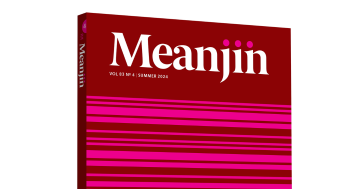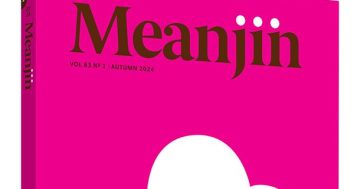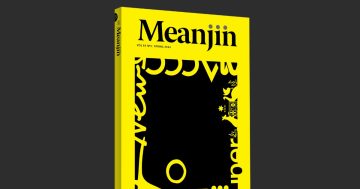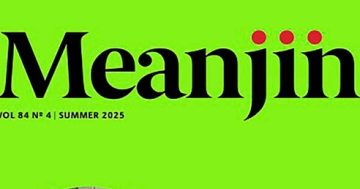Reviewed by Rama Gaind.
Edited by Esther Anatolitis, Melbourne University Publishing, $24.99.
 Some pertinent questions relating to language are foremost in the Winter 2023 edition. What is it doing? How does it enlist us into its project? What does it presume to fix for all time? What is it constantly unsettling?
Some pertinent questions relating to language are foremost in the Winter 2023 edition. What is it doing? How does it enlist us into its project? What does it presume to fix for all time? What is it constantly unsettling?
Volume 82, No.2 marks a new direction for the journal. It’s the first edition to reframe The Meanjin Paper as a piece by a First Nations Elder that greets us the moment we sit down to read.
Editor Esther Anatolitis says it’s the first to introduce new sections that assess the state of the nation, welcome experiments and cast a long gaze across one particular field.
Is it possible to be heard without a voice?
Under a State of the Nation category, award-winning journalist and broadcaster Dan Bourchier writes about ‘Journalism and the Referendum’.
“A Proposed Law: to alter the Constitution to recognise the First Peoples of Australia by establishing an Aboriginal and Torres Strait Islander Voice. Do you approve this proposed alteration?” This is the question all enrolled Australians will be asked later this year. Yes or No. They are the options you will have at the ballot box. When you look at it like that, it appears to be a simple question, an uncomplicated expectation. But it’s not.
Bourchier sets out to unravel “the much more complicated pathway that led to this vote: the complexity of colonisation and its lasting impacts; the pain and intergenerational trauma of the White Australia policy; the forced removal of children that led to the Stolen Generations…”
“Then there’s the crippling disparity in life expectancy, health and education outcomes, overincarceration in prison – just some of the measures of Closing the Gap, the majority of which are going backwards. The annual reporting of which Professor Marcia Langton described as a ‘misery fest’.”
This Meanjin Quarterly also features new poetry, fiction, essays, memoir and more.







